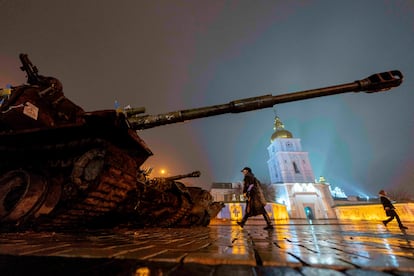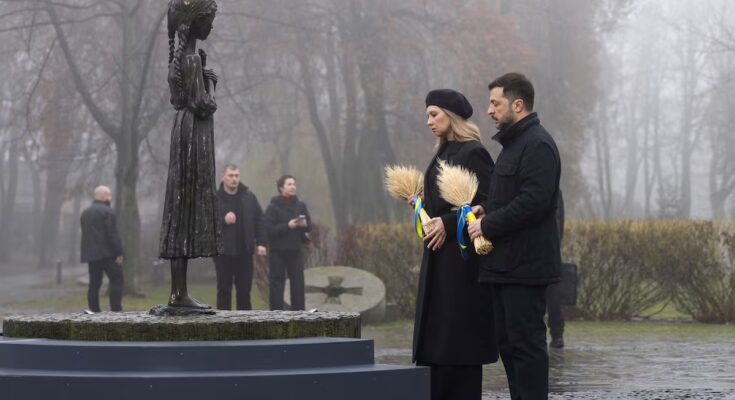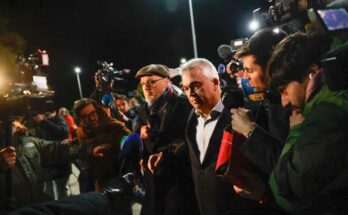Ukraine is facing the moment of truth, Volodymyr Zelensky announced in a stark speech to the nation on Friday. “Either you lose your dignity or you lose a key ally,” the president said. This ally is the United States and it is not just any partner: it was the main supplier of weapons in the first three years of the war. Everything changed when Donald Trump arrived at the White House last January and demonstrated his affinity with his Russian counterpart, Vladimir Putin, from his first day in office. The “peace plan” that Trump is now demanding from Zelensky is a capitulation to the invader, who the Ukrainian president would consider to have lost his dignity.
What Zelensky asked citizens in his message is a question that had to come sooner or later: do Ukrainians and their political representatives want to give in to Russian interests and thus stop the war? Or are they willing to keep fighting even if the situation only gets worse? The president made this even clearer when he warned that if dignity is maintained, the country will face “an extremely harsh winter.”
The “extremely hard” period has already begun. Russian bombing of electricity system causes 14-hour daily power outages. This is accompanied by the interruption of the heating, telephone or hot water system. On the war front the situation is no longer simple: despite the heroic Ukrainian defense, the Russian army is advancing in Donetsk, Kharkiv and has just started a new offensive in the south, in the province of Zaporizhzhia.
If Trump’s veiled threats to cut US military aid to Ukraine are implemented, if Zelensky does not respond to the ultimatum to accept his peace plan, the situation at the front and in the rear will worsen. Especially since Ukraine may be left without American intelligence that allows it to detect enemy military positions from Russian planes taking off.
The greatest political crisis
Fatigue inevitably accumulates in Ukrainian society and there are clear signs of this: 1.5 million men avoiding compulsory conscription, according to official data; desertions and unauthorized abandonments of posts in the army, which today equate, according to data from the Attorney General’s Office, to 20% of the troops; and the first major political crisis that the president suffers in the almost four years of war due to corruption.
On July 22, Zelenskiy opened Pandora’s box by urgently presenting a legal reform to the Rada, the legislative chamber, which effectively canceled the independence of the country’s anti-corruption agencies. MPs were given a few hours to vote. Zelenskyj’s decision cost him the first demonstrations in the streets of Ukraine in almost four years of war, and the first rift with Europe.
Four months later, few doubt that that movement was a reaction to cover up a wave of fraud that would affect the head of state’s confidence environment.
Zelensky rescinded his desire for the National Anti-Corruption Agency (NABU) and the Anti-Corruption Prosecutor’s Office (SAPO) to be under the orders of the Prosecutor General, a position he appointed. From NABU and SAPO it was then leaked to the media that the main reason for the president’s broadside against their autonomy had a first and last name: Timur Mindich.
Mindich was one of the head of state’s most trusted friends and his partner in the audiovisual production company Kvartal 95, which turned Zelensky into a famous actor. NABU and SAPO had been tracking Mindich for months and recorded hundreds of hours of his conversations. The content of these investigations would be explosive and the detonation occurred last November. Anti-corruption agencies have made public records showing that Mindich was the mastermind of a ring of bribes from contracts with the state atomic energy company Energoatom. The fraud would amount to more than 85 million euros.
Two of the main people under investigation, Mindich and businessman Oleksandr Zukerman, fled Ukraine on November 10, just hours before the NABU searched their homes.
The Energoatom case has already involved two ministers: the head of Energy, Svitlana Grinchuk, and her predecessor and Minister of Justice, German Galuschenko. But not only that: former deputy prime minister Oleksi Chernishov, another man from Zelenskiy’s circle, was arrested this week on charges of collaborating with Mindich in laundering money from illegal Energoatom commissions. Chernishov was released on bail shortly afterwards.
Double threat
Mindich’s tentacles don’t end there: NABU and SAPO have records that would prove that the businessman and Zelenskyj partner took advantage of his contacts to negotiate contracts with Rustem Umerov, former Defense Minister and current secretary of the National Security Council. Umerov is also one of the president’s most trusted people.
Umerov is a figure who embodies the double threat looming over Zelensky. On the one hand he is questioned about something as sacred as the management of defense budgets; On the other hand, his name appeared in the American media this week as a representative of the Ukrainian president who participated in the preparation of Trump’s peace plan. According to this information, Umerov proposed one of the most controversial points: that Ukraine give up prosecuting war crimes committed by Russia and establish an amnesty for all crimes committed during the conflict.
Umerov denied the major on Friday, but the opposition went for the jugular. MP Volodímir Ariev has been asked by European Solidarity, the main opposition force, to demand explanations on what his party considers a clause that will allow Zelenskyj’s circle to not be prosecuted for corruption. According to the American media, in fact, Umerov managed to withdraw a point from the plan which provided for a special check on the management of international funds for Ukraine.
“Such a level of cynicism and arrogance cannot be imagined,” Ariev wrote in a note, “protecting thieves and stolen goods is more important than protecting the interests of Ukraine.” Ariev also believes that the plan that Trump intends to impose on Ukraine is a “capitulation and a tradition” and that accepting it could cause internal instability in the country.
A study by the Gradus Population Center presented last October indicated precisely this risk as one of the factors why the six million Ukrainian refugees in Europe resist returning to their country, even if peace were achieved: according to Gradus, one of the aspects that these displaced people highlight is that the internal political and social situation can be negative if the war ends with a bad agreement for Ukraine.
government of national unity
Despite fighting a war for the country’s survival and despite the fact that their main ally is leaving them in the lurch, the Ukrainian opposition wants the government to fall. European Solidarity seeks a majority to win a motion of censure aimed at overthrowing the head of state’s executive. Former president Petro Poroshenko, leader of European Solidarity, wants to dismiss the Council of Ministers and the Rada to propose a “Government of national unity”, a coalition of all parliamentary forces. Poroshenko assured the support of former Prime Minister Yulia Timoshenko’s group and another opposition force, Golos.

Kira Rudik, leader of Golos, defended in a Nov. 18 statement that a “reset” in Ukraine with a coalition government is essential since holding elections is impossible while martial law is in place. And not only because of martial law, no political party believes that it is possible to hold legislative and presidential elections while a war is underway. “The restart is necessary because the situation will get worse,” said Rudik, “for the president it is a good option to get out of the crisis and thus deal with the unrest, because corruption will be used by our enemies.”
The question is whether dissidence in Servidor del Pueblo will be large enough to overthrow the government. Mikita Poturayev, a deputy from the party group, announced on November 19 that a split is being prepared within Servant of the People to support the creation of a national unity executive. In the last two years there have been more voices like Poturayev’s lamenting the fact that during the war all political power in Ukraine fell into the hands of the president.
Dmitro Razumkov, former president of the Rada and Zelenskyj’s ally in the first two years of his presidency, is one of the ideologists of the formation of a government of national unity. Razumkov assures that the stability of the country depends on the creation of counter-powers to the office of head of state, which currently has no opposition. “Unfortunately, today neither Parliament nor the Government are able to make decisions and implement them independently,” says Razumkov in an interview with EL PAÍS.
The Mystery of Yermak
The situation is so difficult for Zelenskyj that, for the first time, he has been called upon by his own ranks to fire Andrii Yermak, his right-hand man. Yermak’s power in the president’s office is almost absolute and the opposition and the media point out that, although his name does not appear in the NABU transcripts, a member of Zelensky’s circle appears who is Yermak and who is introduced under the name “Ali Baba”. This Ali Baba, according to Mindich’s conversations with his henchmen, worked to block anti-corruption investigations.
There have also been prominent Servant of the People voices publicly calling for Yermak’s replacement. Fedir Venislavski, one of the parliamentary group’s most senior deputies, told Radio Svoboda on November 18 that Yermak’s dismissal was an issue being debated within his ranks: “I didn’t call for Yemak’s resignation, but I think his replacement would definitely be a way to contain the pressure on the government.”
On November 20, the same day Zelensky officially received Trump’s peace plan, he met with his parliamentary group. And he didn’t do it to detail the content of the document, but to make them understand that there would be no changes in the government and that he would not relieve Yermak. Igor Krivosheyev, one of his deputy critics, accused the president on social networks of what he sees as a lack of decisiveness: “We wait for them to take on the inevitable political responsibility, because for us every day has a very high price.”
The irony is that Kremlin spokesman Dmitry Peskov addressed Zelensky with similar words on Friday: “We are making it clear to Zelensky and his government that it would be better to reach an agreement now rather than later. The margin he has left to make decisions independently is shrinking at the pace at which Russian forces are advancing.”
Zelenskyj’s response, in his speech to the nation on Friday, is that the country must now be more united than ever and put “politics” aside: “We must reorient things together, recover sanity. Abandon controversies, stop engaging in politics. The state must function, the Parliament of a country at war must work together. The government of a country at war must work effectively. And all together we must not forget, or confuse, who the real enemy of Ukraine is.”
The answer to this message, according to the opposition, is a government of national unity. “The problem is that Zelenskiy cannot work as a team,” complains Razumkov. “He believes in only one type of management, personal management,” he adds. Whatever the reason, if the president continues to choose to concentrate power on himself, the consequences of the “extremely harsh” months ahead for Ukraine will fall on him.



